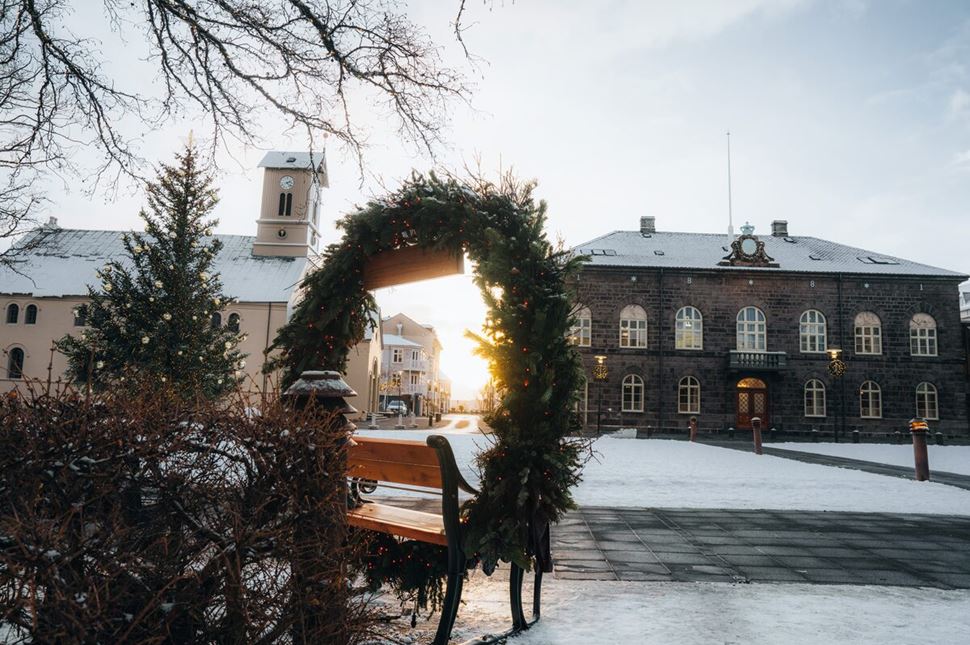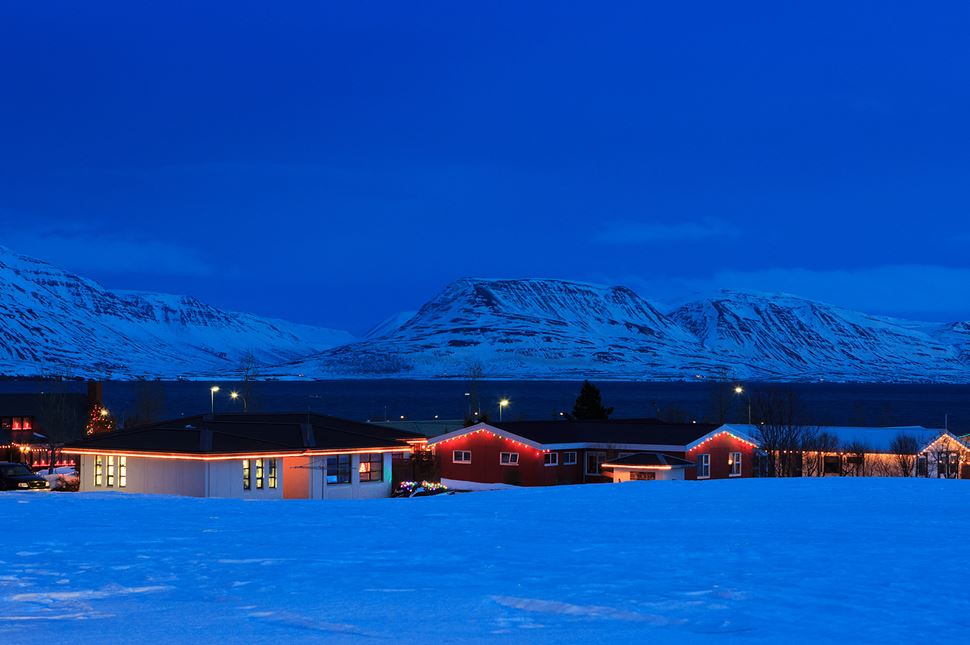Icelanders generally don’t need an excuse to celebrate - they are famously good at making regular days a celebration. Whether it’s an ordinary Friday or Bolludagur (Cream Bun Day), you’ll see signs of festivity throughout everyday life.
In the early days of tourism in Iceland, visiting during National Holidays could be difficult as Icelanders would simply close everything down with little to no warning. However, now that tourism booms year-round, you’ll find this is no longer the case. There is a stricter schedule of play, with only dedicated National Holidays stopping service - and the occasional sunny day when locals flock to the countryside.
Famous attractions in Iceland tend to stay open year-round, perhaps with modified opening hours on National Holidays. You will find that Icelanders still take Christmas and Easter quite seriously. But if you are looking to visit a touristy place, for example, the Blue Lagoon, it will be open all year round, just for a shorter time on the holiest of days.
Are you ready to discover how the holidays may impact your vacation? You will also discover some of the most interesting days Icelanders celebrate.

Reykjavik town christmas decorations. Source: Arctic Adventures.
If you find yourself in Iceland on the 1st of the New Year, you won’t be overly surprised by the celebrations and general atmosphere on the day. In previous years, shops and restaurants would be closed for business. However, with the influx of tourists, many businesses choose to remain open and take advantage of the additional footfall on this National Holiday.
As is common in other European countries, some Icelanders choose to go for a cold sea swim on the 1st of January - the culture of Iceland supports this tradition, with swimming pools being a huge part of everyday life for locals. This is a great way to start the year refreshed, particularly after an evening enjoying the Reykjavík nightlife.
Easter as a National Holiday is arguably one of the most important events in the Icelandic calendar, as far as Icelanders are concerned. While most of the population do not consider themselves religious, the history of this Nordic country has always valued Easter as an important celebration in their year.
Maundy Thursday, the Thursday before Easter Sunday, was the day that marked the last supper that Jesus enjoyed with his disciples. This is a National Holiday in Iceland starting a 5-day weekend, and most offices and businesses will close to allow locals to enjoy time off. Bars in Reykjavík might be open later than usual, sometimes as late as 3 am, as people take advantage of the long weekend. Be aware that if you visit on this day services may be more limited than expected.
As in other countries, Good Friday is traditionally a day spent in solemn contemplation. This means that sinful acts like gambling and drinking were once illegal, and may still be avoided by more religious families. While this is not the case in modern Iceland, most bars across the country will remain closed until Good Friday has passed. Shops will also be closed on this National Holiday, so make sure you have everything you might need before the long Easter weekend!
Easter Sunday is celebrated just as in most other countries as a highly religious day. However, modern Iceland also celebrates with chocolate easter eggs! These tasty treats are given as gifts on this day, with Icelandic eggs known for their high-quality chocolate. Easter egg hunts are also common, whether this is among families at home or public events.
Easter Sunday is also a popular time for a family meal. This is typically a lamb roast with plenty of vegetables for families to enjoy while spending time with their loved ones. Again, stores are shut, so make sure to use the day before (Saturday) to grab those necessities!
Sumardagurinn Fyrsti is an annual public holiday and the first summer day in the Old Norse calendar, which was used in Iceland up until the 19th century. This calendar divided the year into only two seasons: six months of short days (winter) and six months of so-called nightless days (summer). Even though the actual summer weather has not yet arrived, Sumardagurinn Fyrsti is all about appreciating the old Icelandic ways and the lengthening of days.
It is celebrated on the first Thursday after April 18th, which means the exact date can vary between April 19th and 25th. Icelanders mark the public holiday with parades, outdoor activities like barbeques or picnics, and family gatherings.
May Day, also called Labor Day, celebrates previous efforts of labor movements. Historically, this day was marked by protests in the street against a number of international movements and injustices. You might find parades or protests taking place on this day on the main shopping street of the capital, Laugavegur, which can be a powerful experience.
Ascension Day is marked 40 days after Easter Sunday in Iceland as the day that Jesus ascended into heaven. This religious day has been a part of the Icelandic calendar for thousands of years. Religious Icelanders will spend this day in church, whereas for others it is another public holiday to spend with family or relaxing with other leisure activities.
For the majority of the Icelandic population, Whit Sunday is simply another public holiday to enjoy. It is yet another Christian celebration in the Icelandic calendar, exactly 10 days after Ascension Day. Whit Sunday (or Whit Monday) is traditionally to celebrate the Holy Spirit being revealed to the followers of Jesus after his ascension to heaven. Businesses and schools will be closed on this day, so it’s important to note if you’re visiting during this time.
Iceland’s National Day, or Independence Day as it is sometimes known, is an incredibly important day for Icelandic people. June 17th marks the day that Iceland declared independence from Denmark back in 1944. This is also the birthday of a significant member of the fight for Icelandic independence, Jón Sigurdsson. There is a statue in Austurvöllur Square in downtown Reykjavík of Sigurdsson, at which a wreath is placed on this National Holiday. In fact, downtown Reykjavík is the place to be on Independence Day, with celebrations of all kinds taking place here. You’ll find parades, live music, vintage cars, and more lining the streets - this is a great day out for the whole family, for locals and visitors alike.
This public holiday in August is designed to provide respite for Iceland’s shopkeepers and merchants. The long weekend is a popular time for locals to head out of cities and towns into the countryside to camp or stay in family cabins. More importantly, if you’re keen on sampling the nightlife in the capital, this weekend is a big party weekend in Reykjavík. You’ll also find lots of fun activities and parties on the Westman Islands this weekend, so make sure to plan accordingly!

People going down the street in downtown Reykjavík.
Similarly to other European nations, Christmas Eve is when the festivities of Christmas begin, with gift-giving and a sit-down meal at home. Icelandic Christmas Eve traditions take place in the evenings, but public transport and most stores will cease service in the early afternoon. The bells of Hallgrímskirkja Church chime at 6:00 PM on the evening of the 24th, which is when yuletide begins and families will sit down to a traditional Icelandic Christmas feast. After dinner, children will be presented with gifts from their family members.
Christmas in Iceland is typically spent with family. This can involve playing board games, baking, watching films, or heading outside to burn off that Christmas Eve meal. Some bars and restaurants are open on this day, but you’ll need to make reservations in advance.
Boxing Day, or the second day of Christmas, is celebrated similarly to the 25th. Stores and supermarkets will remain closed to the public, but restaurants and bars will resume mostly usual opening hours.
The final event in the Icelandic calendar is, of course, New Year’s Eve. The capital of Reykjavík is renowned for being a great place to spend this evening. Similarly to December 24th, stores and public transport services will cease around 4:00 PM. Restaurants and bars are open late, however, you’ll definitely need to make a reservation if you wish to bring in the New Year with drinks in downtown establishments.
In Icelandic family homes, bonfires are common to bring in the New Year with loved ones. In the capital, it is legal for anyone to set off fireworks, resulting in a non-traditional but fascinating display of lights in the sky. At 10:30 PM, you might find that silence descends during the annual showing of Áramótaskaup (or 'skaupið'). This is a comedy show that makes commentary on local and worldwide events of the previous year and an astounding percentage of the population tune in each year. Some bars will not open until midnight on New Year’s Eve and the celebrations can continue until the early hours.

Typical Icelandic houses with Christmas decorations near Akureyri, Iceland.
1st – Fullveldisdagurinn Íslendinga e. The Day of Iceland’s Sovereignty.